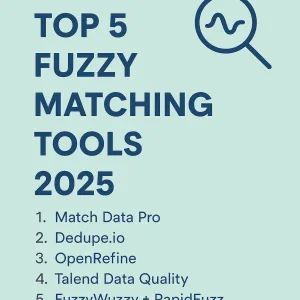Top 5 Fuzzy Matching Tools for 2026

Find the best software to match, link, and deduplicate messy data
Fuzzy matching has become essential for organizations that need to clean data, remove duplicates, or link records across systems. Whether you’re working in Excel or managing millions of records in a data warehouse, the right tool can save time and reduce errors.
Below are the top 5 fuzzy matching tools for 2026—ranging from simple add-ins to full-featured data platforms.
1. Match Data Pro
Best for: Enterprise-scale deduplication, customizable rules, and data quality workflows
Website: matchdatapro.com
Why it stands out:
Match Data Pro is built specifically for scalable fuzzy matching. It supports exact + fuzzy criteria, phonetic algorithms, thresholds, and explainable scoring. Users can automate pipelines or run manual reviews with complete transparency.
Key features:
Multiple match definitions (AND/OR logic)
Advanced similarity algorithms (Jaro-Winkler, phonetics, etc.)
Deduplication, export options, and merge workflows
On-premise and SaaS deployment available
Why Match Data Pro Stays Ahead
While many fuzzy matching tools focus only on string comparison, Match Data Pro now includes AI-powered matching capabilities to streamline your workflow even more. After your data is profiled, our AI can suggest definitions and thresholds, speeding up setup. Once matches are generated by our proprietary engine, AI reviews and validates edge-case groups, flagging questionable matches. The result: highly accurate, consistent match outcomes—without overburdening your system or your team.
2. Excel Fuzzy Lookup Add-In
Best for: Casual users who prefer working inside Excel
Why it stands out:
This free add-in from Microsoft lets you perform fuzzy joins between Excel tables. It’s a great lightweight tool for users familiar with Excel who need to match similar names, addresses, or SKUs without writing code.
Key features:
Simple UI inside Excel
Match scoring between rows
Easy to install and use for beginners
Perfect for: Quick deduplication, small CRM or inventory lists, and anyone who prefers spreadsheets.
3. OpenRefine
Best for: Local, visual data cleanup and clustering
Why it stands out:
OpenRefine allows users to cluster and group similar entries using key collision or fingerprinting algorithms. It’s ideal for standardizing inconsistent values like misspelled names or street addresses.
Key features:
Built-in fuzzy clustering algorithms
Preview and revert changes
GREL scripting support for custom logic
Best for: Analysts, researchers, librarians, and local data prep tasks.
4. Talend Data Quality
Best for: Integrating fuzzy matching into enterprise data pipelines
Why it stands out:
Talend’s data quality suite includes built-in fuzzy matching components, great for embedding into ETL jobs. It supports both rule-based and machine-learning match logic.
Key features:
Visual data preparation
Native integration with Snowflake, BigQuery, and others
Data stewardship and audit tools
Great for: IT and data engineering teams working on centralized pipelines.
5. FuzzyWuzzy + RapidFuzz (Python)
Best for: Developers and data scientists scripting custom match logic
Why it stands out:
These Python libraries use Levenshtein distance and token sorting to calculate similarity. RapidFuzz is a modern, faster version of FuzzyWuzzy and is ideal for production use cases.
Key features:
Multiple similarity methods
Fast, memory-efficient
Easy to integrate with Polars, Pandas, or SQLite
Perfect for: Python-savvy teams building internal matching tools or enrichment processes.
🧠 Final Thoughts: Which Fuzzy Matching Tool is Right for You?
| Tool | Best For |
|---|---|
| Match Data Pro | Large-scale, rule-based matching |
| Excel Fuzzy Lookup | Spreadsheet users, small projects |
| OpenRefine | Interactive cleaning and clustering |
| Talend | ETL teams with enterprise requirements |
| RapidFuzz (Python) | Developers needing fast, scriptable logic |
Fuzzy matching is no longer just a “nice-to-have”—it’s mission-critical for modern data workflows. Whether you’re managing customer data, product lists, or government records, these tools help ensure accuracy, reduce duplicates, and boost trust in your data.
Want to learn more about modern fuzzy matching, data quality pipelines, or how to clean CRM data effectively?
➡️ Explore MatchDataPro.com or book a free demo
